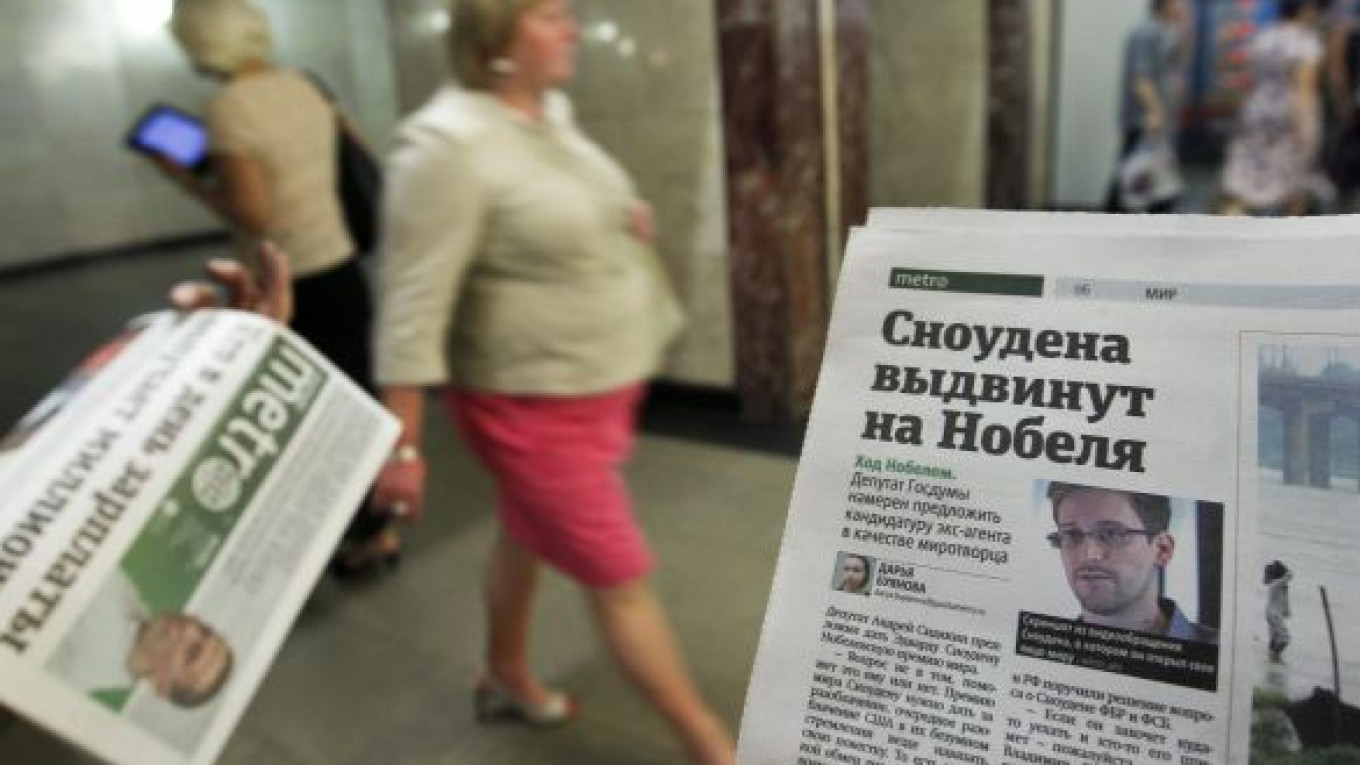American fugitive Edward Snowden's best chance of finding refuge outside the United States may hinge on the president of Venezuela, who was in Moscow on Tuesday meeting with Russian President Vladimir Putin.
President Nicolas Maduro of Venezuela told reporters in Russia on Tuesday that his country had not received an application for asylum from Snowden and dodged the question of whether he would take Snowden with him when he left. But Maduro also defended the former National Security Agency systems analyst, who released sensitive documents on U.S. intelligence-gathering operations.
"He did not kill anyone and did not plant a bomb," Maduro said ahead of his meeting with Putin, Interfax reported. "What he did was tell a great truth in an effort to prevent wars. He deserves protection under international and humanitarian law."
During his Kremlin meeting with Putin, Maduro spoke about plans to build on the strong ties with Russia formed under his late predecessor, Hugo Chavez, but neither he nor Putin mentioned Snowden in their public statements.
Kremlin-friendly newspaper Izvestia reported Monday that the two presidents would discuss Snowden, adding to speculation that arrangements would be made for him to travel to Venezuela. Snowden had initially booked flights to Havana, Cuba, and then on to Caracas, Venezuela, before becoming trapped in legal limbo. He is believed to be in the transit zone of Moscow's Sheremetyevo Airport.
Another option for Snowden may be Bolivia, whose president also met with Putin during a summit of major gas exporters in the Kremlin. President Evo Morales said in an interview with Russia Today television that Bolivia would be willing to consider granting asylum to Snowden.
Snowden withdrew a bid for asylum in Russia when he learned the terms Moscow had set out, according to Putin's spokesman Dmitry Peskov. Putin said on Monday that Russia was ready to shelter Snowden as long as he stopped leaking U.S. secrets.
At the same time, Putin said he had no plans to turn Snowden over to the United States.
Snowden has applied for asylum in Venezuela, Bolivia and 18 other countries, according to WikiLeaks, a secret-spilling website that has been advising him. Many European countries on the list — including Austria, Finland, Germany, the Netherlands, Norway, Spain and Switzerland — said he would have to make his request on their soil.
Polish Foreign Minister Radek Sikorski, whose consent for asylum would be required, said in a message posted on Twitter that he would not grant the request.
WikiLeaks said requests have also been made to Brazil, China, Cuba, Ecuador, France, Iceland, India, Italy, Ireland and Nicaragua.
India's External Affairs Ministry spokesman Syed Akbaruddin said Delhi had carefully examined the asylum request and decided to turn it down. And Brazil's Foreign Ministry spokesman Tovar da Silva Nunes said the government "does not plan to respond" to the asylum request.
WikiLeaks also posted a statement attributed to Snowden on its website late Monday in which he slammed President Barack Obama for "using citizenship as a weapon."
"Although I am convicted of nothing, [the United States] has unilaterally revoked my passport, leaving me a stateless person," Snowden says in the statement. "Without any judicial order, the administration now seeks to stop me exercising a basic right. A right that belongs to everybody. The right to seek asylum.
"Their purpose is to frighten not me, but those who would come after me."
The Russian government says that Snowden, who has been on the run since releasing the sensitive NSA documents, has remained in the transit zone of Sheremetyevo since his arrival from Hong Kong on June 23.
WikiLeaks legal adviser Sarah Harrison delivered the request for asylum to an official at the Russian consulate at the Moscow airport on Sunday, according to the group that has adopted Snowden and his cause.
Ecuador, where he had initially hoped to get asylum, has been giving mixed signals about offering him shelter.
Britain's Press Association news agency said it had obtained a letter from Snowden to Ecuadorean President Rafael Correa thanking him for considering his asylum request.
"There are few world leaders who would risk standing for the human rights of an individual against the most powerful government on earth, and the bravery of Ecuador and its people is an example to the world," PA quoted the letter as saying. The agency said it had obtained the Spanish-language letter from sources in Quito, the capital of Ecuador.
Correa, however, appeared cool to Snowden in an interview with the Guardian newspaper.
Asked whether he would like to meet Snowden, Correa was quoted as saying: "Not particularly. He's a very complicated person. Strictly speaking, Mr. Snowden spied for some time."
He was quoted as saying that Ecuador would not consider an asylum request until Snowden was on its territory and his government would not help him travel to Ecuador.
Related articles:
A Message from The Moscow Times:
Dear readers,
We are facing unprecedented challenges. Russia's Prosecutor General's Office has designated The Moscow Times as an "undesirable" organization, criminalizing our work and putting our staff at risk of prosecution. This follows our earlier unjust labeling as a "foreign agent."
These actions are direct attempts to silence independent journalism in Russia. The authorities claim our work "discredits the decisions of the Russian leadership." We see things differently: we strive to provide accurate, unbiased reporting on Russia.
We, the journalists of The Moscow Times, refuse to be silenced. But to continue our work, we need your help.
Your support, no matter how small, makes a world of difference. If you can, please support us monthly starting from just $2. It's quick to set up, and every contribution makes a significant impact.
By supporting The Moscow Times, you're defending open, independent journalism in the face of repression. Thank you for standing with us.
Remind me later.


